Julian (emperor)


Flavius Claudius Julianus (c. 331 – 26 June 363) was a Hellenistic philosopher, military leader, Roman emperor, and satirist, often referred to as Julian the Apostate because of his rejection of formal Christian doctrines, and opposition to their spread, and sometimes as Julian II, to distinguish him from Didius Julianus. Sometimes now referred to as Julian the Philosopher, he was the last pagan Augustus of the Roman Empire.
Quotes[edit]

General sources[edit]
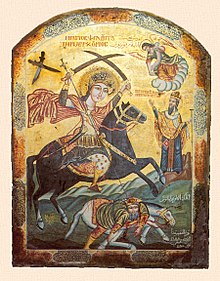




- By purple death I'm seized and fate supreme.
- Lines from Homer's Iliad which Julian recited upon his elevation to Caesar by Constantius II, as recorded by Ammianus Marcellinus in book XV of his history; such elevations had often proven fatal to others.
- Whither are we fleeing, my most valiant men? Do you not know that flight never leads to safety, but shows the folly of a useless effort? Let us return to our companions, to be at least sharers in their coming glory, if it is without consideration that we are abandoning them as they fight for the Republic.
- Julian, to his fleeing troops at the Battle of Strasbourg, as recorded by Ammianus Marcellinus, in Book XVI of his history. His army rallied and defeated the German forces. Here, the term "republic" was used in its literal Latin meaning to denote the Roman state.
- Can anyone be proved innocent, if it be enough to have accused him?
- Julian, at the trial of Numerius, governor of Gallia Narbonensis, who was accused of embezzlement. Numerius had successfully defended himself against the prosecutor Delphidius, who in his exasperation, declared whether anyone could be found guilty if they only denied the charges, which provoked Julian's response. As quoted in Book XVIII of Ammianus's History.
- Indeed I have observed that even the Barbarians across the Rhine sing savage songs composed in language not unlike the croaking of harsh-voiced birds, and that they delight in such songs. For I think it is always the case that inferior musicians, though they annoy their audiences, give very great pleasure to themselves
- Julian, on the songs of the early Germans. As quoted in his Mispogon.
- "Suppose that I and Athene, at the behest of Zeus", said Helios, "were to make you steward of all these in the room of him that hath the inheritance." Then the young man clung to him once more, and besought him greatly that he might remain there. But he said, "Be not very rebellious, lest the excess of my love be turned to the fierceness of hatred."
So the young man answered, "Most mighty Helios, and thee Athene, and Zeus himself, I do adjure, do with me what ye will."
After this Hermes, suddenly reappearing, filled him with new courage, for now he thought he had found a guide for his return journey, and his sojourn on earth. And Athene said, "Listen, most goodly child of mine and of this good sire divine! This heir, you see, finds no pleasure in the best of his shepherds, while the flatterers and rogues have made him their subject and slave. Consequently the good love him not, while his supposed friends wrong and injure him most fatally. Take heed therefore when you return, not to put the flatterer before the friend. Give ear, my son, to yet a second admonition. Yon sleeper is habitually deceived; do you therefore be sober and watch, that the flatterer may never deceive and cheat you by a show of friendly candor, just as some sooty and grimy smith by dressing in white and plastering his cheeks with enamel might finally induce you to give him one of your daughters to wife. List now to a third admonition. Set a strong watch upon yourself: reverence us and us alone, and of men him that is like us and none other. You see what tricks self-consciousness and dumb-foundering faint-heartedness have played with yonder idiot." Great Helios here took up the discourse and said, "Choose your friends, then treat them as friends; do not regard them like slaves or servants, but associate with them frankly and simply and generously; not saying one thing of them and thinking something else. See how distrust towards friends has damaged yonder heritor. Love your subjects as we love you. Let respect toward us take precedence of all goods: for we are your benefactors and friends and saviours."
At these words the young man's heart was full, and he made ready there and then to obey the Gods implicitly always. "Away, then", said Helios, "and good hope go with you. For we shall be with you everywhere, I and Athene and Hermes here, and with us all the Gods that are in Olympus, and Gods of the air and of the earth, and all manner of deities everywhere, so long as you are holy toward us, loyal to your friends, kindly to your subjects, ruling and guiding them for their good. Never yield yourself a slave to your own desires or theirs. …"- Myth at the end of Julian's oration to the cynic Heracleios, as translated in The Emperor Julian : Paganism and Christianity (1879) by Gerald Henry Rendall, Ch. VI : Julian's Personal Religion, p. 138
- I feel awe of the gods, I love, I revere, I venerate them, and in short have precisely the same feelings towards them as one would have towards kind masters or teachers or fathers or guardians or any beings of that sort.
- "To the Cynic Heracleios" in The Works of the Emperor Julian (1913) edited by W. Heinemann, Vol. II, p. 93
- Are you not aware that all offerings whether great or small that are brought to the gods with piety have equal value, whereas without piety, I will not say hecatombs, but, by the gods, even the Olympian sacrifice of a thousand oxen is merely empty expenditure and nothing else?
- "To the Cynic Heracleios" in The Works of the Emperor Julian (1913) edited by W. Heinemann, Vol II, p. 93
- But why do you not cease to call Mary the mother of God, if Isaiah nowhere says that he that is born of the virgin is the "only begotten Son of God" and "the firstborn of all creation"?
- Against the Galileans (c. 361) as translated in The Works of the Emperor Julian, edited by Wilmer Cave Wright, London, W. Heinemann; New York, The Macmillan co., (1913 - 1923), volume 3, p. 399, ISBN 0674990145 ISBN 9780674990142 .
- I had imagined that the prelates of the Galilaeans were under greater obligations to me than to my predecessor. For in his reign many of them were banished, persecuted, and imprisoned, and many of the so-called heretics were executed … all of this has been reversed in my reign; the banished are allowed to return, and confiscated goods have been returned to the owners. But such is their folly and madness that, just because they can no longer be despots, … or carry out their designs first against their brethren, and then against us, the worshippers of the gods, they are inflamed with fury and stop at nothing in their unprincipled attempts to alarm and enrage the people.
- Edict to the people of Bostra, as quoted in Documents of the Christian Church (1957) by Henry Bettenson
- They are irreverent to the gods and disobedient to our edicts, lenient as they are. For we allow none of them to be dragged to the altars unwillingly... It is therefore my pleasure to announce and publish to all the people by this edict, that they must not abet the seditions of the clergy … They may hold their meetings, if they wish, and offer prayers according to their established use … and for the future, let all people live in harmony … Men should be taught and won over by reason, not by blows, insults, and corporal punishments. I therefore most earnestly admonish the adherents of the true religion not to injure or insult the Galilaeans in any way … Those who are in the wrong in matters of supreme importance are objects of pity rather than of hate ...
- Edict to the people of Bostra, as quoted in Documents of the Christian Church (1957) by Henry Bettenson
- The end and aim of the Cynic philosophy, as indeed of every philosophy, is happiness, but happiness that consists in living according to nature, and not according to the opinions of the multitude.
- As quoted in The Works of the Emperor Julian (1923) by Wilmer Cave France Wright, p. 39; also in The Missing Jesus: Rabbinic Judaism and the New Testament (2003) by Craig Alan Evans, Carl A. Elliott, Bruce Chilton, Jacob Neusner
- The Hellenic religion does not yet prosper as I desire, and it is the fault of those who profess it; for the worship of the gods is on a splendid and magnificent scale, surpassing every prayer and every hope. May Adrasteia pardon my words, for indeed no one, a little while ago, would have ventured even to pray for a change of such a sort or so complete within so short a time. Why, then, do we think that this is enough, why do we not observe that it is their benevolence to strangers, their care for the graves of the dead and the pretended holiness of their lives that have done most to increase atheism? I believe that we ought really and truly to practise every one of these virtues. And it is not enough for you alone to practise them, but so must all the priests in Galatia, without exception. … In every city establish frequent hostels in order that strangers may profit by our benevolence; I do not mean for our own people only, but for others also who are in need of money. I have but now made a plan by which you may be well provided for this; for I have given directions that 30,000 modii of corn shall be assigned every year for the whole of Galatia, and 60,000 pints of wine. I order that one-fifth of this be used for the poor who serve the priests, and the remainder be distributed by us to strangers and beggars. For it is disgraceful that, when no Jew ever has to beg, and the impious Galilaeans support not only their own poor but ours as well, all men see that our people lack aid from us. Teach those of the Hellenic faith to contribute to public service of this sort, and the Hellenic villages to offer their first fruits to the gods; and accustom those who love the Hellenic religion to these good works by teaching them that this was our practice of old.
- Letter to Arsacius, High-priest of Galatia (June? 362), as translated by Emily Wilmer Cave Wright, in The Works of the Emperor Julian, Volume III (1913)
- Is it not absurd when a human being tries to find happiness somewhere outside himself, and thinks that wealth and birth and the influence of friends… is of the utmost importance?
- As quoted in The Works of the Emperor Julian (1923) by Wilmer Cave France Wright, p. 41
- So long as you are a slave to the opinions of the many you have not yet approached freedom or tasted its nectar… But I do not mean by this that we ought to be shameless before all men and to do what we ought not; but all that we refrain from and all that we do, let us not do or refrain from merely because it seems to the multitude somehow honorable or base, but because it is forbidden by reason and the god within us.
- As quoted in The Works of the Emperor Julian (1923) by Wilmer Cave France Wright, p. 47
- I think he who knows himself will know accurately, not the opinion of others about him, but what he is in reality… he ought to discover within himself what is right for him to do and not learn it from without…
- As quoted in The Works of the Emperor Julian (1923) by Wilmer Cave France Wright, p. 91
- By the gods I do not want the Galileans to be killed or beaten unjustly nor to suffer any other ill. I do, however, state that the god-fearing (theosebeis) should be preferred to them … honour should go to the gods and to the men and cities that worship them.
- As quoted in Julian the Apostate (1978), by G. W. Bowersock, Ch. 8 : The Puritanical Pagan, p, 83
- Nature loves to hide her secrets, and she does not suffer the hidden truth about the essential nature of the gods to be flung in naked words to the ears of the profane…
- "Oration VII": "To the Cynic Heracleios", as quoted in The Works of the Emperor Julian (1923) by Wilmer Cave France Wright, p. 105; also in Hidden Wisdom: Esoteric Traditions and the Roots of Christian Mysticism (2005) by Gedaliahu A. G. Stroumsa, p. 25
- Zeal to do all that is in one's power is, in truth, a proof of piety.
- As quoted in The Works of the Emperor Julian (1923) by Wilmer Cave France Wright, p. 311; also in The Paganism Reader (2004) edited by Chas S. Clifton, Graham Harvey, p. 26
- Most opportunely friends, has the time now come for me to leave life, which I rejoice to return to Nature, at her demand, like an honorable debtor, not (as some might think) bowed down with sorrow, but having learned much from the general conviction of philosophers how much happier the soul is than the body, and bearing in mind that whenever a better condition is severed from a worse, one should rejoice, rather than grieve...Considering, then that the aim of a just ruler is the welfare and security of its subjects, I was always, as you know, more inclined to peaceful measures, excluding from my conduct all license, the corrupter of deeds and of character…And therefore I thank the eternal power that I meet my end, not from secret plots, nor from the pain of a tedious illness, nor by the fate of a criminal, but that in the mid-career of glorious renown I have been founds worthy of so noble a departure from this world...
- Julian, mortally wounded in battle, upon his deathbed, as recorded by Ammianus Marcellinus (who was probably present) in Book XXV of his history.
- Who and from where are you Dionysus?
Since by the true Bacchus,
I do not recognize you; I know only the son of Zeus.
While he smells like nectar, you smell like a goat.
Can it be then that the Celts because of lack of grapes
Made you from cereals? Therefore one should call you
Demetrius, not Dionysus, rather wheat born and Bromus,
Not Bromius.
- No wild beasts are so dangerous to men as Christians are to one another.
- As quoted by Ammianus Marcellinus, as translated in Barbarians: An Alternative Roman History (2006) by Terry Jones, p. 205 ISBN 9780563539162
- Let us not admit discourses by Epicureans or Pyrrhonists – though indeed the gods have already in their wisdom destroyed their works, so that most of their books are no longer available. Nevertheless, there is no reason why I should not, by way of example, mention these works too, to show what sort of discourses priests must especially avoid; and if such discourses, then much more must they avoid such thoughts.
- Fragmentum Epistulae 288a-305d
The Caesars (c. 361)[edit]



that according to our laws and decrees the victor is
allowed to exult but the vanquished must not complain.
- "It is the season of the Kronia, during which the god allows us to make merry. But, my dear friend, as I have no talent for amusing or entertaining I must methinks take pains not to talk mere nonsense."
"But, Caesar, can there be anyone so dull and stupid as to take pains over jesting? I always thought that such pleasantries were a relaxation of the mind and a relief from pains and cares."
"Yes, and no doubt your view is correct, but that is not how the matter strikes me. For by nature I have no turn for raillery, or parody, or raising a laugh."
- I too am not one to despise myths, and I am far from rejecting those that have the right tendency; indeed I am of the same opinion as you and your admired, or rather the universally admired, Plato. He also often conveyed a serious lesson in his myths.
- As for the beauty of the gods, not even Hermes tried to describe it in his tale; he said that it transcended description, and must be comprehended by the eye of the mind; for in words it was hard to portray and impossible to convey to mortal ears. Never indeed will there be or appear an orator so gifted that he could describe such surpassing beauty as shines forth on the countenance of the gods.
- The trial that begins
Awards to him who wins
The fairest prize to-day.
And lo, the hour is here
And summons you. Appear!
Ye may no more delay.
Come hear the herald's call
Ye princes one and all.
Many tribes of men
Submissive to you then!
How keen in war your swords!
But now 'tis wisdom's turn;
Now let your rivals learn
How keen can be your words.
- Hermes addressed Marcus and said, "and you, Verus, what did you think the noblest ambition in life?" In a low voice he answered modestly, "To imitate the gods." This answer they at once agreed was highly noble and in fact the best possible. And even Hermes did not wish to cross-examine him further, since he was convinced that Marcus would answer every question equally well.
The other gods were of the same mind; only Silenus cried "By Dionysus I shall not let this sophist off so easily. Why then did you eat bread and drink wine and not ambrosia and nectar like us?" "Nay," he replied "it was not in the fashion of my meat and drink that I thought to imitate the gods. But I nourished my body because I believed, though perhaps falsely, that even your bodies require to be nourished by the fumes of sacrifice. Not that I supposed I ought to imitate you in that respect, but rather your minds."
For the moment Silenus was at a loss as though he had been hit by a good boxer, then he said: "There is perhaps something in what you say; but now tell me what did you think was really meant by 'imitating the gods.'"
"Having the fewest possible needs, and doing good to the greatest possible number."
- Know all ye mortals who have entered this contest,
that according to our laws and decrees the victor is
allowed to exult but the vanquished must not complain.
Depart then wherever you please, and in future live
every one of you under the guidance of the gods.
Let every man choose his own guardian and guide.
Against the Galilaeans (c. 362)[edit]


- Against the Galilaeans (c. 362) as translated by Wilmer Cave Wright (fragmentary portions, as preserved in Contra Julianum by Cyril of Alexandria)
- All of us, without being taught, have attained to a belief in some sort of divinity, though it is not easy for all men to know the precise truth about it, nor is it possible for those who do know it to tell it to all men. … Surely, besides this conception which is common to all men, there is another also. I mean that we are all by nature so closely dependent on the heavens and the gods that are visible therein, that even if any man conceives of another god besides these, he in every case assigns to him the heavens as his dwelling-place; not that he thereby separates him from the earth, but he so to speak establishes the King of the All in the heavens as in the most honourable place of all, and conceives of him as overseeing from there the affairs of this world. What need have I to summon Hellenes and Hebrews as witnesses of this? There exists no man who does not stretch out his hands towards the heavens when he prays; and whether he swears by one god or several, if he has any notion at all of the divine, he turns heavenward. And it was very natural that men should feel thus.
- It is not sufficient to say, "God spake and it was so." For the natures of things that are created ought to harmonise with the commands of God. I will say more clearly what I mean. Did God ordain that fire should mount upwards by chance and earth sink down? Was it not necessary, in order that the ordinance of God should be fulfilled, for the former to be light and the latter to weigh heavy? And in the case of other things also this is equally true.
- Men's works also are naturally perishable and mutable and subject to every kind of alteration. But since God is eternal, it follows that of such sort are his ordinances also. And since they are such, they are either the natures of things or are accordant with the nature of things. For how could nature be at variance with the ordinance of God? How could it fall out of harmony therewith?
- If the immediate creator of the universe be he who is proclaimed by Moses, then we hold nobler beliefs concerning him, inasmuch as we consider him to be the master of all things in general, but that there are besides national gods who are subordinate to him and are like viceroys of a king, each administering separately his own province; and, moreover, we do not make him the sectional rival of the gods whose station is subordinate to his. But if Moses first pays honour to a sectional god, and then makes the lordship of the whole universe contrast with his power, then it is better to believe as we do, and to recognise the God of the All, though not without apprehending also the God of Moses; this is better, I say, than to honour one who has been assigned the lordship over a very small portion, instead of the creator of all things.
Upon the Sovereign Sun (362)[edit]

- Oration upon the Sovereign Sun, also known as a discourse to Helios the King addressed to Sallust, calling for celebration of ceremonies of the Birth of Sol Invictus on 25 December (c. December 362), as translated by C. W. King in Julian the Emperor (1888) - Full text online
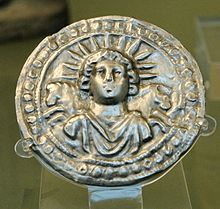










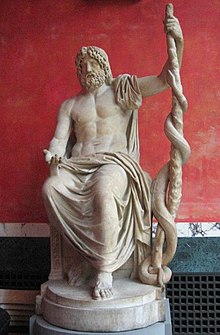
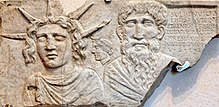
- It is my opinion that the present subject interests all: "Whatever breathes, and moves upon the earth," all that are endowed with existence, with a rational soul, and with a mind: but that above all others it interests myself, inasmuch as I am a votary of the Sun.
- From my earliest infancy I was possessed with a strange longing for the solar rays, so that when, as a boy, I cast my eyes upon the ethereal splendour, my soul felt seized and carried up out of itself. And not merely was it my delight to gaze upon the solar brightness, but at night also whenever I walked out in clear weather, disregarding all else, I used to fix my eyes upon the beauty of the heavens; so that I neither paid attention to what was said to me, nor took any notice of what was going on. On this account, people used to think me too much given to such pursuits, and far too inquisitive for my age: and they even suspected me, long before my beard was grown, of practising divination by means of the heavenly bodies. And. yet at that time no book on the subject had fallen into my hands, and I was utterly ignorant of what that science meant. But what use is it to quote these matters, when I have still stranger things to mention; if I should mention what I at that time thought about the gods? But let oblivion rest upon that epoch of darkness! How the radiance of heaven, diffused all round me, used to lift up my soul to its own contemplation! to such a degree that I discovered for myself that the moon's motion was in the opposite direction to that of the rest of the system, long before I met with any works giving the philosophy of such matters.
- My own belief is, if philosophers be entitled to any credit, that the Sun is the common parent of all men, to use a comprehensive term. It is a true proverb, "Man begets man, and so does the Sun:" but souls that luminary showers down upon earth, both out of himself, and out of the other gods: which souls show to what end they were propagated by the kind of life that they pursue. But well is it for that man who, from the third generation backwards, and a long succession of years, has been dedicated to the service of this god; yet neither is that person's condition to be despised who, feeling in his own nature that he is a servant of this deity, alone, or with few on his side, shall have devoted himself to his worship.
- Come then, and let us celebrate in the best way we can the anniversary festival which the imperial city is keeping by sacrifices, with unusual splendour. And yet I feel how difficult it is for the human mind even to form a conception of that Sun who is not visible to the sense, if our notion of Him is to be derived from the Sun that is visible; but to express the same in language, however inadequately, is, perhaps, beyond the capability of man! To fitly explain His glory, I am very well aware, is a thing impossible; in lauding it, however, mediocrity seems the highest point to which human eloquence is able to attain.
- That divine and all-beauteous World, which from the highest vault of Heaven down to the lowest Earth is held together by the immutable providence of God, and which has existed from all eternity, without creation, and shall be eternal for all time to come, and which is not regulated by anything, except approximately by the Fifth Body (of which the principle is the solar light) placed, as it were, on the second step below the world of intelligence; and finally by the means of the "Sovereign of all things, around whom all things stand." This Being, whether properly to be called "That which is above comprehension," or the "Type of things existing," or "The One," (inasmuch as Unity appears to be the most ancient of all things), or "The Good," as Plato regularly designates Him, This, then, is the Single Principle of all things, and which serves to the universe as a model of indescribable beauty, perfection, unity, and power. And after the pattern of the primary substance that dwells within the Principle, He hath sent forth out of Himself, and like in all things unto Himself, the Sun, a mighty god, made up of equal parts of intelligible and creative causes. And this is the sense of the divine Plato, where he writes, "You may say (replied I) that I mean the offspring of the Good, whom the Good has produced, similar to itself; in order that, what the Good is in the region of intelligence, and as regards things only appreciable by the mind, its offspring should be the same in the region that is visible, and in the things that are appreciable by the sight." For this reason I believe that the light of the Sun bears the same relation to things visible as Truth does to things intelligible. But this Whole, inasmuch as it emanates from the Model and "Idea" of the primal and supreme Good, and exists from all eternity around his immutable being, has received sovereignty also over the gods appreciable by the intellect alone, and communicates to them the same good things, (because they belong to the world of intelligence), as are poured down from the Supreme Good upon the other objects of Intelligence. For to these latter, the Supreme Good is the source, as I believe, of beauty, perfection, existence, and union; holding them together and illuminating them by its own virtue which is the "Idea" of the Good.
- The same things, therefore, does the Sun communicate to things intelligible, over whom he was appointed by the Good to reign and to command: although these were created and began to exist at the same moment with himself.
- The Phoenicians who from their sagacity and learning possess great insight into things divine, hold the doctrine that this universally diffused radiance is a part of the "Soul of the Stars." This opinion is consistent with sound reason: if we consider the light that is without body, we shall perceive that of such light the source cannot be a body, but rather the simple action of a mind, which spreads itself by means of illumination as far as its proper seat; to which the middle region of the heavens is contiguous, from which place it shines forth with all its vigour and fills the heavenly orbs, illuminating at the same time the whole universe with its divine and pure radiance.
- We ought to acquiesce in the reasoning of the Egyptian priests, who raise altars to the Sun conjointly with Jupiter; nay, rather we should assent to Apollo himself (long before them), who sits on the same throne with Jove, and whose words are,
- From which we must conclude that the sovereignty of the Sun and of Jupiter amongst the deities that are objects of intellect is held in common, or rather is one and the same.
- We must not suppose any corporeal conjunction or marriage in the case — all which are merely the sportive fables of Poetry; but must hold the father and the producer of that Being as something most divine and super-eminent. Of such a nature is He who is above all things, around whom, and by reason of whom, all things do subsist. But Homer calls him by his father's name, "Hyperion," in order to show that he is independent, and not subjected to any constraint.
- But let us now dismiss these poetical fictions; because with what is divine they have mingled much of human alloy; and let us now consider what the deity has declared concerning himself and the other gods.
The region surrounding the Earth has its existence in virtue of birth. From whom then does it receive its eternity and imperishability, if not from him who holds all things together within defined limits, for it is impossible that the nature of bodies (material) should be without a limit, inasmuch as they cannot dispense with a Final Cause, nor exist through themselves.
- The good effects that emanate from the same source are equally diffused upon the earth. Different regions become partakers in these benefits in different ways; so that neither their production comes to an end, nor does the Deity confer his blessings upon the recipient world with any degree of variation. For where the substance is the same, so is the action thereof, in the case of Divine Powers; especially with him who is king of them all, namely, the Sun; of whom the motion is the most simple amongst all the bodies that move in a contrary direction to the world, which fact that most excellent philosopher, Aristotle, adduces to prove the superiority of that luminary to the others.
- I pray the Sovereign Sun himself to grant me ability to explain the nature of the station that he holds amongst those in whose middle he is placed! By the term "middle" we are to understand not what is so defined in the case of things contrary to each other, as "equi-distant from the extremes," as orange and dark brown in the case of colours; lukewarm, in that of hot and cold, and other things of the sort; but the power that collects and unites into one things dispersed, like the "Harmony" of Empedocles, from which he completely excludes all discord and contention.
- The one absolutely, the Intelligible, the ever Preexisting, comprehending all the universe together within the One — nay, more, is not the whole world One living thing — all and everywhere full of life and soul, perfect and made up out of parts likewise perfect? Now of this double unity the most perfect part (I mean of the Unity in the Intelligible World that comprehends all things in One, and of the Unity encompassing the Sensible World, that brings together all things into a single and perfect nature) is the perfection of the sovereign Sun, which is central and single, and placed in the middle of the intermediate Powers.
- One indeed is the Creator of all things, but many are the creative powers revolving in the heavens; we must, therefore, place the influence of the Sun as intermediate with respect to each single operation affecting the earth. Moreover, the principle productive of Life is vastly superabundant in the Intelligible World; our world, also, is evidently full of generative life. It is therefore clear that the life-producing power of the sovereign Sun is intermediate between these two, since the phenomena of Nature bear testimony to the fact; for some kinds of things the Sun brings to perfection, others of them he brings to pass, others he regulates, others he excites, and there exists nothing that, without the creative influence of the Sun, comes to light and is born.
- A very weighty argument is this — namely, that neither does the light which descends from thence, chiefly upon the world, mix itself with anything, nor admit of dirtiness or pollution, but remains entirely, and in all things that are, free from defilement, admixture, and suffering. Besides, we must pay attention to the other kinds of phenomena, both to the Intelligible, and yet more to the Sensible — whatever are connected with matter, or will manifest themselves in relation to our subject.
- To explain, however, everything relating to the nature of this deity, is beyond the power of man, even though the god himself should grant him the ability to understand it: in a case where it seems, to me at least, impossible even mentally to conceive all its extent. And now that we have discussed so much, we must put as it were a seal upon this subject; and to stay a while and pass on to other points no less requiring examination. What then is this seal; and what comprises everything, as it were in a summary of the conception concerning the nature of the god? May He Himself inspire our understanding when we attempt briefly to explain the source out of which he proceeded; and what he is himself; and with what effects he fills the visible world. It must therefore be laid down that the sovereign Sun proceeded from the One God, — One out of the one Intelligible world; he is stationed in the middle of the Intelligible Powers, according to the strictest sense of "middle position;" bringing the last with the first into a union both harmonious and loving, and which fastens together the things that were divided: containing within himself the means of perfecting, of cementing together, of generative life, and of the uniform existence, and to the world of Sense, the author of all kinds of good; not merely adorning and cheering it with the radiance wherewith he himself illumines the same, but also by making subordinate to himself the existence of the Solar Angels; and containing within himself the unbegotten Cause of things begotten; and moreover, prior to this, the unfading, unchanging source of things eternal.
All, therefore, that was fitting to be said touching the nature of this deity (although very much has been passed over in silence) has now been stated at some length.
- As a general rule, all that has been hitherto advanced respecting the nature of this deity, must be understood to refer to his properties: for the nature of the god is not one thing, and his influence another: and truly, besides these two, his energy a third thing: seeing that all things which he wills, these he is, he can, and he works. For neither doth he will that which he is not; nor is he without strength to do that which he wills; nor doth he will that which he cannot effect. Now this is very different in the case of men, for theirs is a double nature mixed up in one, that of soul and body; the former divine, the latter full of darkness and obscurity: hence naturally arise warfare and discord between the two.
- But how many are the final causes of union, the most beautiful, which this deity contains within himself? The Sun, that is, Apollo, is "Leader of the Muses;" and inasmuch as he completes our life with good order, he produces in the world Æsculapius; for even before the world was, he had the latter by his side.
But were one to discuss the numerous other qualities belonging to this god, he would never arrive to the end of them.
- The visible world has, as I have said, subsisted around him from all eternity: and the Light also which surrounds the world has also its place from all eternity, not intermittently, nor in different degrees at different times, but constantly and in an equable manner. But whosoever will attempt to estimate, as far as thought goes, this external Nature, by the measure of Time, he will very easily discover respecting the Sun, Sovereign of all things, of how many blessings he is, from all eternity, the author to the world.
- I am aware that the great Plato himself, and after him, a man posterior to him in date, though not in mind, I mean Iamblichus of Chalcis (who initiated us into other branches of philosophy, and also into this by means of his discourses), did both of them as far as hypothesis goes, take for granted the fact of a Creation and assumed the universe to have been, in a certain sense, the Work of Time, in order that the most important of the effects produced by this Power, may be reduced into a shape for examination.
- The entire heaven, making its parts everywhere harmonize with him, is filled with spirits emanating out of the Sun. For this god is ruler of five orbits in the heavens, and whilst traversing three out of these orbits, he produces in three the Graces, themselves three in number, the remaining circles form the Scales to the Balance of supreme Necessity.
- Of all things nothing exists that is not by its substance the offspring of ocean. But why will you have me tell this to the vulgar? Although better to have been shrouded in silence, it nevertheless has been spoken; at all events I declare it, although all men will not readily receive the same.
- Wherefore should I mention to you Horus, and the other names of gods, all of them belonging in reality to the Sun? For we men have gained our notion of the god from the works which the same god actually works — he that hath made the universal heaven perfect through his Intelligible blessings, and given to the same a share of his Intelligible beauty. And beginning from that point, himself wholly and partially by the giving of good men … for they superintend every motion as far as the extremest limits of the universe. And Nature and Soul, and all that at any time exists, all these, and in all places, does he bring to perfection; and after having marshalled so vast a host of deities into one governing unity, he has given to them Athene, or Providence; who, mythology says, sprung forth out of the head of Jupiter; but whom we assert to have been projected entire out of the entire Sovereign Sun, for she was contained within him, in this particular dissenting from the legend, in that we do not hold her to have sprung out of the topmost part, but all entire, and out of the entire god.
- Unto men Athene gives good things — namely, wisdom, understanding, and the creative arts; and she dwells in their citadels, I suppose, as being the founder of civil government through the communication of her own wisdom.
Now for a few words about Aphrodite, whom the Phoenician theologians agree in making co-operate in the work of creation with the last-mentioned goddess — and I believe they are right. She, then, is the mingling together of the celestial deities, and of the harmony of the same, for the purposes of love and unification. For she being near to the Sun, and running her course together with him, and approaching close to him, she fills the heavens with a good temperament, she imparts to the earth the generative power, whilst she herself provides for the perpetuity of generation of animals, of which generation the Sovereign Sun contains the final efficient cause. She, however, is joint cause with him, enthralling our souls by the aid of pleasure, whilst she sheds down from the aether upon the earth her rays so delightful and pure, more lustrous than gold itself.
- In the same manner therefore as we have laid it down that the Sun holds the supremacy in the Intelligible world, having round about his own being, in one species, a vast multitude of gods (supposing him to have the same in the Sensible world), all of which move along their everlasting and most felicitous course in a circle, so do we prove him to be Leader and Lord, imparting to and filling the whole heaven, as he does, with his own splendour, likewise with infinite other blessings that be invisible to us: whilst the benefits commenced by the other deities are brought to perfection by him; nay, more, before this, these gods themselves were rendered perfect through his spontaneous and divine operation.
- I make known unto thee how He hath provided for the bodily health of us all, by having produced Æsculapius, the Preserver of the universe; and how he hath communicated to us virtue of every kind, by sending down Aphrodite in company with Athene for our guardian; having made it all but a law that no one should use copulation except for the end of generating his like. For this reason truly, according to his revolutions and seasons, do the various vegetable and animal races feel themselves stirred towards the generation of their kind. What need is there to magnify the glory of his rays, and of his light? A night without moon, and without stars, how terrible is it! Let anyone reflect on this, in order that he may estimate how great a blessing is the light we derive from the Sun!
- We celebrate the most solemn of our Games, dedicating it to the honour of the "Invincible Sun," during which it is not lawful for anything cruel (although necessary), which the previous month presented in its Shows, should be perpetrated on this occasion. The Saturnalia, being the concluding festival, are closely followed in cyclic order by the Festival of the Sun; the which I hope that the Powers above will grant me frequently to chaunt, and to celebrate; and above all others may the Sovereign Sun, lord of the universe! He who proceeding from all eternity in the generative being of the Good, stationed as the central one amidst the central intelligible deities, and replenishing them all with concord, infinite beauty, generative superabundance, and perfect intelligence, and with all blessings collectively without limit of time; and in time present illuminating his station which moves as the centre of all the heavens, his own possession from all eternity!
- On the same subject you will obtain more complete and more abstruse information by consulting the works upon it composed by the divine Iamblichus: you will find there the extreme limit of human wisdom attained. May the mighty Sun grant me to attain to no less knowledge of himself, and to teach it publicly to all, and privately to such as are worthy to receive it: and as long as the god grants this to us, let us consult in common his well-beloved Iamblichus; out of whose abundance a few things, that have come into my mind, I have here set down. That no other person will treat of this subject more perfectly than he has done, I am well aware; not even though he should expend much additional labour in making new discoveries in the research; for in all probability he will go astray from the most correct conception of the nature of the god.
- Inasmuch as it is my wish only to compose a hymn of thanksgiving in honour of the god, I have deemed it quite sufficient to discourse to the best of my ability concerning his nature. I do not think I have wasted words to no purpose: the maxim, "Sacrifice to the immortal gods according to thy means," I accept as applying not merely to burnt-offerings, but also to our praises addressed unto the gods. I pray for the third time, in return for this my good intention, the Sun lord of the universe to be propitious to me, and to bestow on me a virtuous life, a more perfect understanding, and a superhuman intellect, and a very easy release from the trammels of life at the time appointed: and after that release, an ascension up to himself, and an abiding place with him, if possible, for all time to come; or if that be too great a recompense for my past life, many and long-continued revolutions around his presence!
Upon The Mother Of The Gods (c. 362-363)[edit]

- Upon The Mother Of The Gods (c. 362-363) as translated by C. W. King in Julian the Emperor (1888) - Full text online; Julian and Libanius declare that this was written in one night in the winter of 362/363)

- Must we then speak of this subject also: and shall we write concerning things that are not to be told, and shall we publish things not to be divulged, and secrets not to be spoken aloud? Who indeed is Attis or Gallos; who the Mother of the Gods; what is the reason of this rule of Chastity; moreover for what cause has such an institution been established among us from remote antiquity; handed down to us indeed from the most ancient of the Phrygians, but accepted in the first place by the Greeks — and those not the vulgar herd, but the Athenians — taught by the event that they had not done well in ridiculing him that was performing the rites of the Great Mother. For they are said to have insulted and driven off the Gallos, as one who was making innovations in religion: because they did not understand the character of the goddess, or how that she was the very "Deo", "Rhea," and " "Demeter" so much honoured amongst them themselves.
- I am not indeed ignorant that certain over-wise people will call these legends "old wives' fables," and not worth listening to; but I think, for my part, that in such matters it is better to believe the testimony of nations than of those witty individuals, whose little soul is acute indeed, but has a clear insight into no one thing.
- I lay it down that there is Matter, and also there are Material Species, but unless a Final Cause for them be previously assumed, we shall be, without perceiving it, introducing the doctrine of Epicurus: since if nothing be anterior to two efficient causes, a spontaneous flux and chance must have united the two together.
- To what purpose, pray, exist all these things that be born? Whence come male and female? Whence the difference in kind of all things that be, amongst visible species, unless there be certain pre-existing and previously established Reasons and Causes subsisting beforehand, in the nature of a pattern? With regard to which, though we are dull of sight, yet let us strive to clear away the mist from the eyes of the soul.
- It is not Matter itself that is here meant, but the ultimate Cause of things incorporeal, which also existed before Matter. Moreover, it is asserted by Heraclitus: "Death unto souls is but a change to liquid." This Attis, therefore, the intelligible Power, the holder together of things material below the Moon, having intercourse with the pre-ordained Cause of Matter, holds intercourse therewith, not as a male with a female, but as though flowing into it, since he is the same with it.
- Who then is the Mother of the Gods? She is the Source of the Intelligible and Creative Powers, which direct the visible ones; she that gave birth to and copulated with the mighty Jupiter: she that exists as a great goddess next to the Great One, and in union with the Great Creator; she that is dispenser of all life; cause of all birth; most easily accomplishing all that is made; generating without passion; creating all that exists in concert with the Father; herself a virgin, without mother, sharing the throne of Jupiter, the mother in very truth of all the gods; for by receiving within herself the causes of all the intelligible deities that be above the world, she became the source to things the objects of intellect.
- When the Sun touches the equinoctial circle, where that which is most definite is placed (for equality is definite, but inequality indefinite and inexplicable); at that very moment (according to the report), the Sacred Tree is cut down; then come the other rites in their order; whereof some are done in compliance with rules that be holy and not to be divulged; others for reasons allowable to be discussed. The "Cutting of the Tree;" this part refers to the legend about the Gallos, and has nothing to do with the rites which it accompanies; for the gods have thereby, I fancy, taught us symbolically that we ought to pluck what is most beautiful on earth, namely virtue joined with piety, and offer the same unto the goddess, for a token of good government here below. For the Tree springs up out of the earth and aspires upwards into the air; it is likewise beautiful to see and be seen, and to afford us shade in hot weather; and furthermore to produce, and regale us with its fruit; thus a large share of a generous nature resides in it. The rite, therefore, enjoins upon us who are celestial by our nature, but who have been carried down to earth, to reap virtue joined with piety from our conduct upon earth, and to aspire upwards unto the deity, the primal source of being and the fount of life.
- Let nobody suppose me to say that all these things were done and happened formerly without the gods themselves knowing what they meant to do; or as though they were chastising their own faults. The causes of things that be, the ancients (whether with the gods to guide them, or discovering them by their unassisted efforts, but better to say seeking them out under the guidance of the gods), when they had discovered them, wrapped up the same in strange fables, in order that the fiction, being detected through its own extravagance and obscurity, might draw us on to the investigation of the Truth. For the vulgar, incapable of reasoning, derive sufficient benefit from what is conveyed by means of symbols; whilst to those of superior intellect, the truth respecting the gods will then only be serviceable, when they through diligent research shall find it out and lay hold thereof: whilst they are reminded by means of dark legends that it is their duty to inquire; and that they may advance to the end, as to the summit of the thing, after they have discerned it by means of such research; not so much out of respect and confidence in the judgment of others, as in the exertion of one's own understanding upon other objects.
- I consider myself especially indebted to all the gods together, and more than all to the Great Mother in this particular instance (as in all others) that she did not suffer me to wander about, as it were in the dark, but firstly commanded me to cut away, not as regards my body, but as regards the irrational appetites and motions of the soul, all that was superfluous and empty, by the aid of the Cause, the object of intellect, and which presides over souls, whilst she herself enabled me to conceive certain notions perhaps not discordant with a true, and at the same time, reverential understanding of divine matters.
- O Mother of gods and men, assister and colleague of mighty Jove! O source of the Intelligible Powers! Thou that keepest thy course in unison with the simple essences of things intelligible; thou that hast received out of all the universal Cause, and impartest it to the Intelligible world! Goddess, giver of life, Mother, Providence, and Maker of our souls! Thou that lovest the mighty Bacchus; who didst preserve Attis when he was cast forth, and didst recall him to thyself after he had sunk down into the cave of the earth; thou that art the beginning of all Good unto the Intelligible Powers, and that fillest the world with all the objects of Sense, and grantest all good things, in all places, unto mankind! Grant unto all men happiness, of which the sum and substance is the knowledge of the gods; and to the Roman people universally, first and foremost to wash away from themselves the stain of atheism, and in addition to this, grant them propitious Fortune, that shall assist them in governing the empire for many thousands of years to come! To myself grant for the fruit of my devotion to thee — Truth in belief concerning the gods, the attainment of perfection in religious rites, and in all the undertakings which we attempt as regards warlike or military measures, valour coupled with good luck, and the termination of my life to be without pain, and happy in the good hope of a departure for your abodes!
Misattributed[edit]
- Vicisti, Galilaee or "νενίκηκας Γαλιλαῖε"
- Thou hast conquered, Galilean!
- This exclamation has often been attributed to Julian, as his last words, but it actually originates much later with the derisive account of his death by Theodoret in Ecclesiastical History, Book III, Ch. 20 (c. 429), as an exclamation he made upon being fatally wounded; no prior account of such an declaration exists, even among those writers most hostile to Julian and his policies.
- Variant translations:
- Thou hast won, O Galilean!
- You have conquered, Galilean!
- You have won, Galilean.
Quotes about Julian[edit]
- Alphabetized by author
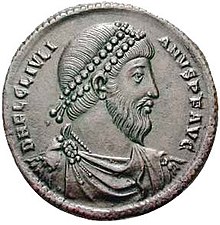

The vile, the appalling Julian
reigns no longer. ~ Constantine P. Cavafy
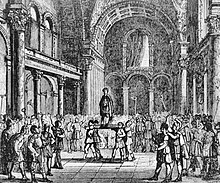
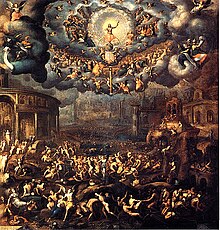
- Julian is without question one of antiquity's most enigmatic and compelling figures. He attempted the impossible by restoring for a moment the pagan gods to their former primacy, a feat which horrified the Christians and probably perplexed rather than inspired the majority of surviving pagans.
Julian was a man of action and at the same time a man whose spiritual life brought him close to many of the most extreme wonder-workers of his age. … Anyone who believes that he can write an authoritative biography of Julian, with everything tidily in place from beginning to end, is deluding himself. The historian can only grope toward the facts about the man and his reign, but the groping is its own reward.- G. W. Bowersock, in Julian the Apostate (1978), Prologue, p. xi
- When the people of Antioch taunted the emperor toward the end of his life with attacks on his beard, he replied in a work full of sarcasm and ironic self-disparagement. The Misopogon (Beard-Hater) … as Julian warmed to his bitter irony, he declared that he seldom cut his hair or nails, "and if you would like to learn anything that is usually a secret, my shaggy chest is covered with hair, like the breasts of lions who are kings among beasts". Julian's unsettling laughter can be heard throughout the Misopogon. … He was a man of ostentatious simplicity. Julian boasted of his ascetism in response to the Antiochenes' charges of boorish and uncivilized behavior: "Sleepless nights on straw and a diet that is anything but filling make my character austere and an enemy to a luxurious city." As a philosopher transformed in Gaul into a soldier, Julian repudiated luxury and disciplined himself beyond the capabilities of most men. … The abstinence of Julian was universally acknowledged by friend and foe alike, and it is an important feature of the austerity of Julian's life.
- G. W. Bowersock, in Julian the Apostate (1978), Ch. 2 : The Personality of the Emperor, p. 13
- Dreams and visions were important to Julian, and he experienced them at decisive moments of his life. He was more rather than less typical of ancient men in his predisposition to such psychic phenomena and in his credulity. While in Gaul and still at the rank of Caesar, Julian wrote in a letter that he had had a prophetic dream in which he saw a very tall tree bending over to the ground from its own weight and height, and beside the small shoot in flower growing out of the roots of the great tree. He feared for the safety of the young plant and when he drew nearer he saw the great tree falling to the ground. The small tree was still standing; its roots remained in the earth, and an unknown person advised the dreamer not to fear for its safety. "God knows what this means," wrote Julian.
- G. W. Bowersock, in Julian the Apostate (1978), Ch. 2 : The Personality of the Emperor, p. 17
- Julian clearly believed in his own destiny. His courage and his fortitude were not illusory. His nearness to his gods strengthened his conviction; and his austere style of life, with its isolation from normal human contacts, equipped him for the single-minded pursuit of his goals.
- G. W. Bowersock, in Julian the Apostate (1978), Ch. 2 : The Personality of the Emperor, p. 20
- He was a tragic figure, a man of infinite promise, cut off before his prime. An American student once compared him to John F. Kennedy. The comparison will not bear close analysis. But the feeling behind it suggests why Julian became the subject of legend within a few years of his death.
- Robert Browning, in The Emperor Julian (1975), p. xiii
Immoral to a degree — and probably more than a degree —
they certainly were. But they had the satisfaction that their life
was the notorious life of Antioch,
delectably sensual, in absolute good taste.To give up all this, indeed, for what?
His hot air about the false gods,
his boring self-advertisement,
his childish fear of the theatre,
his graceless prudery, his ridiculous beard.
- Things impolitic and dangerous:
praise for Greek ideals,
supernatural magic, visits to pagan temples.
Enthusiasm for the ancient gods
- The matter, says Mardonios, has gone too far,
the talk it has aroused must be stopped at all cost. —
So Julian goes to the church at Nicomedia,
a lector again, and there
with deep reverence he reads out loud
passages from the Holy Scriptures,
and everyone marvels at his Christian piety.- Constantine P. Cavafy, in "Julian in Nicomedia"
- His friends weren’t Christians; that much was certain.
But even so they couldn’t play
as he could (brought up a Christian)
with a new religious system,
ludicrous in both theory and application.
They were, after all, Greeks. Nothing in excess, Augustus.
- The empire is delivered at last.
The vile, the appalling Julian
reigns no longer.- Constantine P. Cavafy, in "A Great Procession of Priests and Laymen"; it should be noted that there is much irony in Cavafy's poetry, and this is especially evident here.
- The Emperor Julian, who restored to the Empire its old religion, which had been abolished by Constantine the Apostate, is justly regarded as an opponent of the Galilean. And, when perusing the petty treatises of Julian, one is struck with the number of ideas this enemy of the Christians held in common with them. He, like them, is a monotheist; with them, he believes in the merits of abstinence, fasting, and mortification of the flesh; with them, he despises carnal pleasures, and considers he will rise in favour with the gods by avoiding women; finally, he pushes Christian sentiment to the degree of rejoicing over his dirty beard and his black finger-nails. The Emperor Julian's morals were almost those of St. Gregory Nazianzen. There is nothing in this but what is natural and usual. The transformations undergone by morals and ideas are never sudden. The greatest changes in social life are wrought imperceptibly, and are only seen from afar. Christianity did not secure a foothold until such time as the condition of morals accommodated itself to it, and as Christianity itself had become adjusted to the condition of morals. It was unable to substitute itself for paganism until such time as paganism came to resemble it, and itself came to resemble paganism.
- Anatole France, in The White Stone (1905), Ch. III, p. 135
- Hating pomp and show, impatient of the petty, hampering rules of Court etiquette, constantly dwelling in thought on the ancient glories of democratic Athens and senatorial Rome, he could hardly view the orientalising and inordinate exaltation of the Imperial dignity in the light of a reform. Yet his almost single-handed efforts to revive the great days of the Roman Senate and of Greek municipal freedom were not productive of very great results, either for good or for evil. … As to the change in spiritual conditions, this was to him not merely an adverse element of the environment in which he had to work; it was the destruction of all that he held dear and believed to be most necessary for the common good. He felt bound to prevent such a destruction at any cost, or to perish in the attempt.
- Alice Gardner, in Julian, Philosopher and Emperor : And the Last Struggle of Paganism against Christianity (1895), p. 5
- While the Romans languished under the ignominious tyranny of eunuchs and bishops, the praises of Julian were repeated with transport in every part of the empire, except in the palace of Constantius. The barbarians of Germany had felt, and still dreaded, the arms of the young Caesar; his soldiers were the companions of his victory; the grateful provincials enjoyed the blessings of his reign; but the favorites, who had opposed his elevation, were offended by his virtues; and they justly considered the friend of the people as the enemy of the court. As long as the fame of Julian was doubtful, the buffoons of the palace, who were skilled in the language of satire, tried the efficacy of those arts which they had so often practised with success.
- Edward Gibbon, in History of the Decline and Fall of the Roman Empire Vol. II, Ch. XXII : Julian Declared Emperor — Part I
- At the dawn of day, the soldiers, whose zeal was irritated by opposition, forcibly entered the palace, seized, with respectful violence, the object of their choice, guarded Julian with drawn swords through the streets of Paris, placed him on the tribunal, and with repeated shouts saluted him as their emperor. Prudence, as well as loyalty, inculcated the propriety of resisting their treasonable designs; and of preparing, for his oppressed virtue, the excuse of violence. Addressing himself by turns to the multitude and to individuals, he sometimes implored their mercy, and sometimes expressed his indignation; conjured them not to sully the fame of their immortal victories; and ventured to promise, that if they would immediately return to their allegiance, he would undertake to obtain from the emperor not only a free and gracious pardon, but even the revocation of the orders which had excited their resentment. But the soldiers, who were conscious of their guilt, chose rather to depend on the gratitude of Julian, than on the clemency of the emperor. Their zeal was insensibly turned into impatience, and their impatience into rage. The inflexible Caesar sustained, till the third hour of the day, their prayers, their reproaches, and their menaces; nor did he yield, till he had been repeatedly assured, that if he wished to live, he must consent to reign. He was exalted on a shield in the presence, and amidst the unanimous acclamations, of the troops; a rich military collar, which was offered by chance, supplied the want of a diadem; the ceremony was concluded by the promise of a moderate donative; and the new emperor, overwhelmed with real or affected grief retired into the most secret recesses of his apartment.
- Edward Gibbon, on the troops of Julian, in rebellion against the orders of Constantius, proclaiming Julian Augustus, in History of the Decline and Fall of the Roman Empire Vol. II, Ch. XXII : Julian Declared Emperor — Part I
- To moderate the zeal of his party, to protect the persons of his enemies, to defeat and to despise the secret enterprises which were formed against his life and dignity, were the cares which employed the first days of the reign of the new emperor. Although he was firmly resolved to maintain the station which he had assumed, he was still desirous of saving his country from the calamities of civil war, of declining a contest with the superior forces of Constantius, and of preserving his own character from the reproach of perfidy and ingratitude. Adorned with the ensigns of military and imperial pomp, Julian showed himself in the field of Mars to the soldiers, who glowed with ardent enthusiasm in the cause of their pupil, their leader, and their friend. He recapitulated their victories, lamented their sufferings, applauded their resolution, animated their hopes, and checked their impetuosity; nor did he dismiss the assembly, till he had obtained a solemn promise from the troops, that if the emperor of the East would subscribe an equitable treaty, they would renounce any views of conquest, and satisfy themselves with the tranquil possession of the Gallic provinces.
- Edward Gibbon, on Julian's first actions after being proclaimed Augustus by his troops, in History of the Decline and Fall of the Roman Empire Vol. II, Ch. XXII : Julian Declared Emperor — Part I
- That power which circumstances placed in my hands, and which is an emanation of divinity, I am conscious of having used to the best of my skill. I have never wittingly wronged any one. For this campaign there were good and sufficient reasons; and if some should think that I have not fulfilled all expectations, they ought in justice to reflect that there is a mysterious power without us, which in a great measure governs the issue of human undertakings.
- Henrik Ibsen's depiction of Julian in Emperor and Galilean (1873)
- Erring soul of man — if thou wast indeed forced to err, it shall surely be accounted to thee for good on that great day when the Mighty One shall descend in the clouds to judge the living dead and the dead who are yet alive!
- Henrik Ibsen in Emperor and Galilean (1873)
- Of all the emperors, one there was whom I recall from boyhood — bold in war, a lawgiver, far-famed in word and deed; he cared much for his country, but cared not for the true faith, and loved a host of gods. False to the Lord, although true to the world.
- Adrian Murdoch, in The Last Pagan (2003), depicting remarks of Prudentius.
- More than any other Hellenic thinker, Julian insisted on the virtue of paradox and on the importance of the search for religious truth.
- Gedaliahu A. G. Stroumsa, in Hidden Wisdom: Esoteric Traditions and the Roots of Christian Mysticism (2005)
- Julian’s folly was yet more clearly manifested by his death. He crossed the river that separates the Roman Empire from the Persian, brought over his army, and then forthwith burnt his boats, so making his men fight not in willing but in forced obedience. The best generals are wont to fill their troops with enthusiasm, and, if they see them growing discouraged, to cheer them and raise their hopes; but Julian by burning the bridge of retreat cut off all good hope. A further proof of his incompetence was his failure to fulfil the duty of foraging in all directions and providing his troops with supplies. Julian had neither ordered supplies to be brought from Rome, nor did he make any bountiful provision by ravaging the enemy’s country. He left the inhabited world behind him, and persisted in marching through the wilderness. His soldiers had not enough to eat and drink; they were without guides; they were marching astray in a desert land. Thus they saw the folly of their most wise emperor. In the midst of their murmuring and grumbling they suddenly found him who had struggled in mad rage against his Maker wounded to death. Ares who raises the war-din had never come to help him as he promised; Loxias had given lying divination; he who glads him in the thunderbolts had hurled no bolt on the man who dealt the fatal blow; the boasting of his threats was dashed to the ground. The name of the man who dealt that righteous stroke no one knows to this day. Some say that he was wounded by an invisible being, others by one of the Nomads who were called Ishmaelites; others by a trooper who could not endure the pains of famine in the wilderness. But whether it were man or angel who plied the steel, without doubt the doer of the deed was the minister of the will of God. It is related that when Julian had received the wound, he filled his hand with blood, flung it into the air and cried, "Thou hast won, O Galilean." Thus he gave utterance at once to a confession of the victory and to a blasphemy. So infatuated was he.
- Theodoret, in Ecclesiastical History, Book III, Ch. 20 (c. 429); this is usually accepted as the origin of the spurious tradition of the last words of Julian being "Thou hast won, O Galilean." No mention of such a declaration occurs in the accounts of any earlier writers, even those most hostile to Julian.
External links[edit]
- The Julian Society
- Panegyric upon Julian by Libanius, who knew him well and admired him.
- The Emperor Julian : Paganism and Christianity (1879) By Gerald Henry Rendall
- Julian - "The Caesars" aka "Symposium" aka "Kronia" (361 CE) - translated by Wilmer Cave Wright
- Against the Galilaeans (c. 362) as translated by Wilmer Cave Wright (fragmentary portions, as preserved in Contra Julianum by Cyril of Alexandria)
- Imperial Laws and Letters Involving Religion, some of which are by Julian relating to Christianity.
- Julian's Spin Doctor: The Persian Mutiny, article by Adam J. Bravo
- Rowland Smith's "Julian's Gods", reviewed by Thomas Banchich
- Excerpt from by Adrian Murdoch, The Last Pagan at the California Literary Review]
- A 4th century chalcedony portrait of Julian


